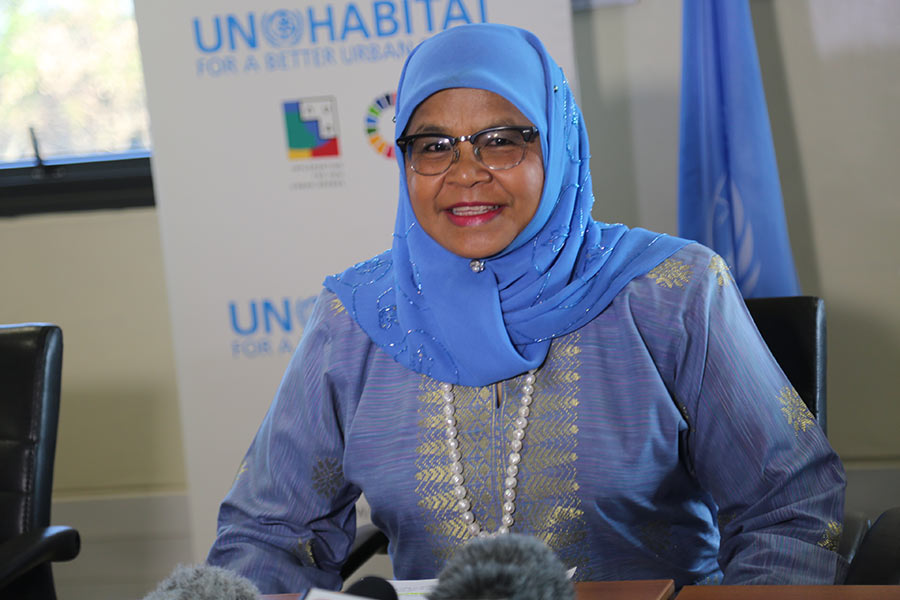UN official has praise for China's urbanization
By Edith Mutethya | chinadaily.com.cn | Updated: 2018-10-02 09:30

Barely a week after the world celebrated Habitat Day on Oct 1, marking the beginning of Urban October, a month of activities, events and discussions around urban sustainability, UN Habitat is calling on African countries to draw lessons from China — a place making significant progress.
Maimunah Mohd Sharif, the UN undersecretary general and executive director of UN-Habitat, says the Chinese government has been stressing the importance of improving people's living conditions, putting people first and making cities livable and sustainable.
She says China has integrated its policies and has localized its urban agenda and sustainable goals, a strategy that African countries should replicate. This is in addition to ensuring continuity to improve the situation.
"We facilitate experience-sharing between African countries and China, taking into account the Belt and the Road Initiative as well as South-South cooperation," she said.
Sharif hopes the importance of making cities livable and sustainable will be better understood by the end of the month.
She congratulated Xuzhou, a city in China's Jiangsu province, for being one of the 2018 UN-Habitat Scroll of Honor winners. The city got the award for promoting holistic and broad-based approaches to ecological restoration through intelligent waste management.
"This is a significant award for Xuzhou, which has undertaken a lot of important work to restore the environment and use intelligent solid waste management practices, including rewarding citizens for recycling," she said.
The Scroll of Honor is one of the world's most prestigious awards presented for work on urbanization.
It focuses on outstanding contributions in the field of developing and improving urban lives, provision of housing and highlighting the plight of the poor or displaced, ensuring no one is left behind.
Sharif hopes Xuzhou's best practices can encourage other cities both in China and across the globe to move forward in implementing sustainable development goals. Xuzhou's experience has been extended to 166 cities in China.
Over the past 40 years, Sharif says China's urbanization rate has increased from around 18 percent in 1978 to nearly 60 percent in 2017. The number of urban residents has increased from 170 million in 1978 to 810 million today and the number of cities has increased from 193 to 657.
China has also experienced massive migration of people from rural to urban areas. During the past 40 years, about 700 million people living in both rural and urban areas have seen their lives improve.
"The Chinese government has adopted a series of policies to address urban inequality as well as improved urban infrastructure, environment and living conditions. But there have been challenges," Sharif said.
As the focal point for sustainable urbanization in the United Nations system, Sharif said UN-Habitat has been committed to supporting countries including China to build a better quality life for everyone, leaving no one behind.
She notes many developing countries lack effective and gender-sensitive urban land development mechanisms, legislative frameworks and governance institutions and systems.
"To address this, UN-Habitat provides policy and operational support for government and cities to identify areas of reform and to adopt laws and legal frameworks that effectively regulate urbanization issues such as land use, urban planning, taxation, housing, infrastructure and safety."
Sharif noted in both developing and developed countries, urban housing is becoming increasingly unaffordable, whether for rent or ownership.
In developed countries, young people are continuing to live with their parents longer as they cannot afford housing on their own. In developing countries, some 881 million urban dwellers were living in slums in 2014, partly owing to the ineffectiveness of land and housing policies.
In responding to these huge challenges, UN-Habitat's work in housing and slum upgrade supports partners and all levels of government to improve supply and affordability of serviced land and new housing opportunities. This is done while also implementing city-wide and national slum upgrading programs to improve housing and the quality of living conditions for the poor.
"UN-Habitat has supported Ghana, Zambia and Myanmar to implement housing strategies. Under the participatory slum upgrading program, 160 cities in 40 countries are implementing slum upgrade and prevention policies, strategies and programs," she said.
























